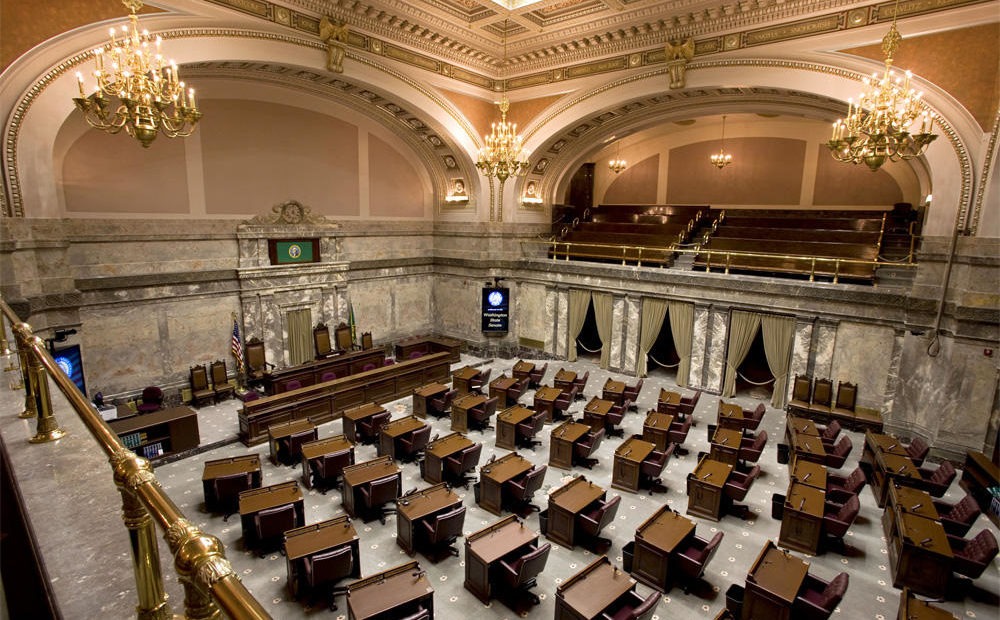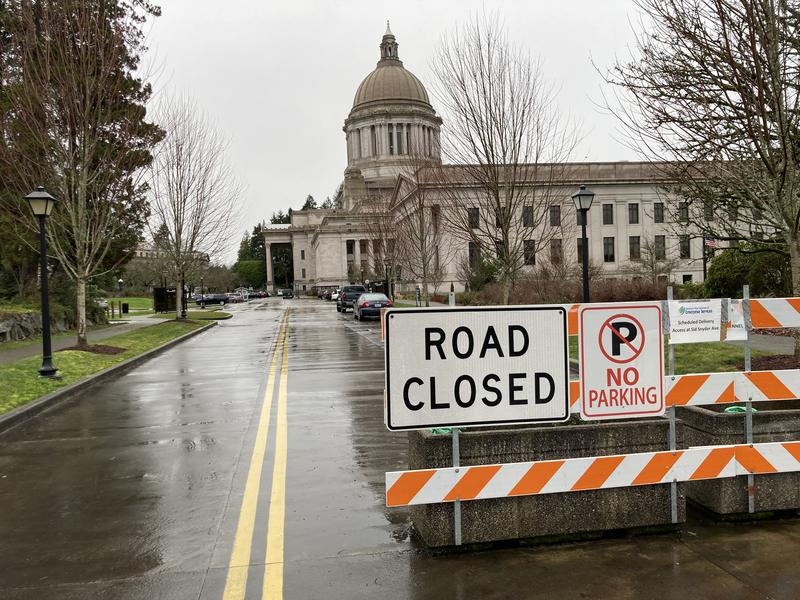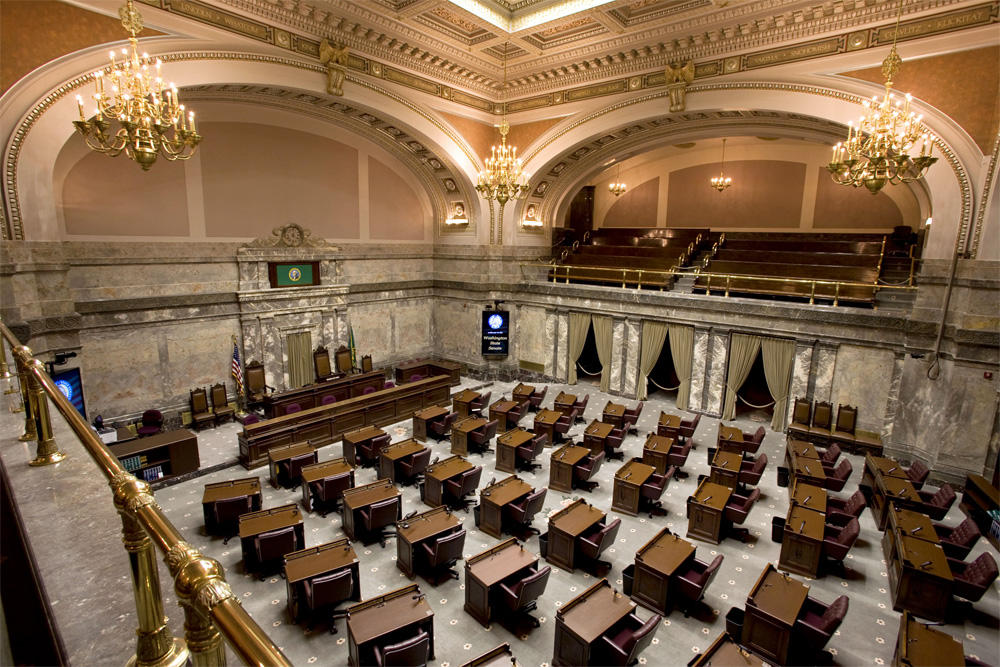
Five Things To Know About Washington’s Upcoming 2021 Legislative Session
READ ON
Amid the ongoing pandemic and threats by far-right protesters to “occupy” the Capitol, Washington lawmakers will convene Monday for what will ultimately be a mostly remote 2021 session with a focus on the ongoing response to COVID-19, police reform, addressing climate change and writing a two-year state budget.
Democrats have solid majorities in both the House and Senate and will set the agenda for the 105-day session. They’re also writing the rules for how the unusual session will unfold.
On day one, members of the House and Senate will gather in person at the Capitol to approve rules to allow for remote lawmaking. [Yes, they have to meet in person to agree to meet remotely.] After that, the 98 member House will shift almost entirely to remote operations. The state Senate, with 49 members, plans to operate in hybrid fashion with some lawmakers at the Capitol and others participating virtually.
The Capitol building itself and legislative office buildings, where public hearings are held, will be closed. All public testimony will instead happen via Zoom – which could actually prove easier for people who live far from Olympia. Unlike in some other states (i.e. Montana), anyone working in the Capitol, including lawmakers, will be required to wear a mask and take other COVID-related precautions.
The historic and unprecedented nature of the legislative session comes as state lawmakers are expected to address a number of high-profile and potentially controversial issues. Here are five things you should know about the upcoming session.
Protests Planned
Beginning Sunday, far-right activists plan to set up a camp on the Capitol campus to protest the closure of the Legislative Building. When the Legislature convenes on Monday, organizers say they will attempt to enter the building and occupy the public galleries above the House and Senate floors.
The organizer of the “Legislative Lockout” protest is Tyler Miller, a Republican precinct committee officer from Kitsap County, who organized two previous so-called “Hazardous Liberty” events at the Capitol last spring to protest Inslee’s COVID-19 restrictions.
In a post on his website, Miller said the exclusion of the public from the Capitol is a violation of the state constitution. While calling for a “peaceful, non-destructive event,” he also said the protesters will create “gauntleted entrances.”
“We will not be breaking into or through any windows or doors, nor will we be accosting or assaulting any persons,” Miller wrote.
Last month, far-right protesters did break windows at the Oregon Capitol and pushed their way into the building during a special session of the Legislature, according to reporting by Oregon Public Broadcasting.
Some of those protesters were armed. An email from Washington 3%, a group that calls itself “God fearing Patriots” and “not an anti-government militia group,” suggests that its members will show up at the Capitol armed.
“We will NOT take violent offensive action of any kind, but we WILL be prepared to defend ourselves while demanding the State follow the Constitution,” wrote Matt Marshall in the email.
The protest planners vow to remain at the Capitol until public access is restored.
Despite the promise to be nonviolent, Deputy House Majority Leader Larry Springer, a Kirkland Democrat, says he’s “very concerned” about the planned protests.
“It’s calculated to intimidate,” Springer said. Meanwhile, state officials are also planning for counterprotests by far-left or anti-fascist protesters. In December, clashes by groups on both ends of the political spectrum resulted in two shooting incidents on and near the Capitol campus.
The move to “occupy” the Capitol comes nearly a decade after the Occupy Wall Street movement against income inequality. During that time, far-left protestors set up an encampment near Capitol Lake (which was ultimately cleared by the Washington State Patrol) and, at one point, disrupted a legislative hearing leading to several arrests.
UPDATE, Jan. 8, 2021: In the wake of the mob takeover of the U.S. Capitol, Washington 3% said its “Legislative Lockout” event was canceled. In a Facebook Live event, Miller of “Hazardous Liberty” also announced he was canceling his event, but said he still planned to be in Olympia on Monday and encouraged supporters to do the same. Authorities are still planning for protests at the Capitol over the weekend and Monday.
Police Reform
Last May’s killing of George Floyd in Minneapolis triggered national protests and calls to end police violence and address racial injustices. In Washington, the death of Manny Ellis at the hands of police in Tacoma last March has also become a rallying cry. In response, Gov. Jay Inslee and majority Democrats in the Legislature have prepared a number of police reform measures for consideration during the 2021 legislative session.
They include:
- A proposal from Inslee to establish an Office of Independent Investigations to investigate allegations of police excessive force.
- A pre-filed bill by Reps. Jesse Johnson and Debra Entenman, who are both Black, that would ban chokeholds and neck restraints, prohibit the use of unleashed police dogs to arrest or apprehend someone, ban the use of tear gas by police, prohibit police from acquiring or using military equipment and make it illegal for on-duty police officers to conceal or obscure their badge number.
- A bill from state Sen. Manka Dhingra, who is a senior deputy King County Prosecutor, requiring police officers to immediately intervene if they witness fellow officers using excessive force and render aid to the victim as soon as it’s safe to do so.
- A bill by state Rep. John Lovick, a retired state trooper, to create statewide policies regarding prosecutor-held “Brady” lists. These are lists of officers whose past conduct has jeopardized their credibility as witnesses in court.
- Other bills would address police officer training and certification, decertification of officers because of bad conduct and state auditor review of police investigations.
COVID-19 Response
Before Washington lawmakers adjourned the 2020 session last March, they hastily approved $200 million in emergency funding to address the looming COVID-19 crisis. At the time, that level of spending seemed like a big deal. Today, it looks rather quaint. Since then, Washington has received and spent about $2 billion in federal relief funds.
During the legislative interim, majority Democrats and the governor waved off calls by minority Republicans to meet in a special session to further address the pandemic.

Washington’s Capitol building will be closed to the public during the 2021 legislative session because of COVID-19. Most lawmakers will work remotely and public testimony will happen via Zoom. CREDIT: Austin Jenkins/N3
Now, though, Inslee is asking the Legislature to move quickly in January to approve $100 million in grants to assist struggling businesses and an additional $100 million in rental assistance. This would be on top of the $100 million fund Inslee created at the end of 2020 – using leftover federal funds — to help restaurants and other businesses hit hard by his decision to suspend indoor dining as well as close gyms, bowling alleys, museums and other spots where people congregate indoors.
In late December, President Trump signed a new $900 billion relief bill into law. Majority Democrats in the Legislature say they’re still assessing what that new funding will cover and what gaps will remain.
More broadly, the ongoing economic and public health fallout from the pandemic is expected to occupy a great deal of the Legislature’s bandwidth this year – whether that’s heading off a massive increase in unemployment insurance premiums or looking for ways to address the disparities and inequities revealed by COVID-19.
Inslee is also calling for a new tax on health care premiums to better fund public health in Washington.
Meanwhile, minority Republicans are likely to call for tax and regulatory relief for businesses and some more conservative Republicans have already proposed bills to ensure people can opt out of taking the COVID-19 vaccine.
Budget/Taxes
If there’s one thing state lawmakers have to do this year, it’s pass a two-year budget that balances over four years. The current budget is $52 billion. In December, Inslee proposed a $57.6 billion spending plan for the next biennium – or an increase of more than 10 percent.
While state revenues have taken a beating from the COVID-induced recession, it’s nothing like the Great Recession when year-over-year tax collections plummeted by double digits. In fact, if projections hold, the state is still on track to take in $3.7 billion more in revenue during the 2021-23 biennium than in the current two-year budget cycle.
Minority Republicans like to focus on that number as evidence of ample revenue. Inslee takes a different view. His budget office notes that the state’s revenue outlook over the combined four years is projected to be $3.3 billion below pre-pandemic projections.
House and Senate Democrats won’t unveil their proposed budgets until this spring. So, Inslee’s December spending blueprint is the best roadmap for now. Because Inslee proposes to spend more than is coming in, his budget once again includes tax proposals, including a state capital gains tax aimed at the state’s “wealthiest taxpayers.”
The idea has strong support among progressive Democrats in the Legislature who see a capital gains tax as not just a source of new revenue, but a step toward making Washington’s tax system less regressive. However, some moderate to conservative Democrats, especially in the state Senate, have cast a wary eye on the tax. And opponents insist it’s an income tax that won’t survive an almost certain constitutional challenge.
While the idea of a capital gains tax keeps coming back (it’s becoming the Groundhog Day of taxes in Washington) the idea hasn’t had the votes to pass — yet. The question is whether, because of the pandemic and the recent election, the political contours around the tax have shifted enough to make 2021 the year it makes it through.
Climate Change
In November, the leaders of the House Democratic Caucus urged their members to limit the number of bills they introduce – because of the complications of legislating during a pandemic – and to focus on four priority areas: racial equity, COVID-19 response, economic recovery and global climate change.
By including climate change on their short list, Democrats are signaling that even a global pandemic won’t shift their attention away from efforts to reduce greenhouse gas emissions. In fact, the two issues are often linked.
It doesn’t hurt that climate change is also Inslee’s signature issue — one he ran for president on before being elected in November to a rare third term as governor.
Once again this year, Inslee and state Rep. Joe Fitzgibbon, who chairs the House environment committee, plan to push for a so-called “clean fuels” standard similar to what British Columbia, Oregon and California have already adopted. Under the proposal, the carbon intensity of fuel sold in Washington would have to be reduced by 10 percent by 2028 and 20 percent by 2035.
Transportation is the leading source of greenhouse gas emissions in Washington. But critics argue the governor’s proposed standard will unnecessarily increase the price of fuel. Like the capital gains tax, the question is: will 2021 be the year this policy makes it through the legislative gauntlet?
In partnership with state Sen. Reuven Carlyle, chair of the Senate environment committee, Inslee also plans to push for passage of what he’s calling the state’s Climate Commitment Act. Among other things, the bill would cap greenhouse gas emissions from the state’s largest polluters and create a carbon credits market. Money raised from the sale of the credits would go to fund climate resilience and environmental justice programs.
Final Notes
Many other issues are likely to be in play in 2021: learning loss as a result of the pandemic, gaps in child care, homelessness, affordable housing and mental health. Lawmakers may also consider whether to restrict the open-carry of firearms at the Capitol and revisit whether to abolish the death penalty.
However, the unprecedented nature of a mostly remote legislative session – think lawmakers debating and voting via Zoom — is likely to affect the number of bills that are passed this year. In fact, there’s already talk that the Legislature will pass a third to half the bills it does in a normal year. We shall see.
Related Stories:

Washington state bill could change how rural communities could work to close a library
Young adult books at the Columbia County Library. Some people have requested to move the YA section into the adult section because of what they call “obscene” material in 100

Washington leaders try to find solutions for wolf depredations and killing of wolves
A gray wolf. (Credit: William Campbell) Listen (Runtime 1:07) Read Some ranchers are saying it is time to find creative ways to deal with wolf attacks on livestock. That’s what

Washington bill aims to reduce ‘fast fashion’ carbon emissions, pollution
Pollution and greenhouse gas emissions from the manufacture of fast fashion are growing just as fast as the industry. A new bill in Washington aims to help lessen the industry’s
















